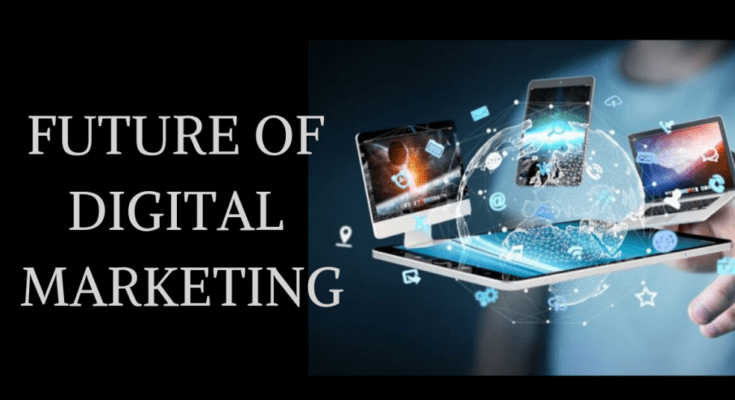Introduction
Future of Digital Marketing has evolved significantly over the years, transforming the way businesses connect with their audiences and promote their products or services. With advancements in technology and shifts in consumer behavior, the landscape of digital marketing continues to evolve rapidly. As we look ahead, it’s crucial for marketers to stay abreast of emerging trends and innovations that will shape the future of digital marketing. In this article, we’ll explore some of the key trends and innovations that are expected to define the future of digital marketing.
- Artificial Intelligence (AI) and Machine Learning
Artificial intelligence (AI) and machine learning have already made a significant impact on digital marketing, and their influence is only expected to grow in the future. AI-powered algorithms enable marketers to analyze vast amounts of data quickly and efficiently, providing valuable insights into consumer behavior, preferences, and trends. Machine learning algorithms can also optimize marketing campaigns in real-time, ensuring that messages are delivered to the right audience at the right time for maximum impact. Additionally, AI-driven chatbots and virtual assistants are becoming increasingly sophisticated, providing personalized customer experiences and improving engagement.
- Voice Search Optimization
With the rising popularity of voice-enabled devices such as smart speakers and virtual assistants, voice search optimization is becoming increasingly important for digital marketers. Voice search presents unique challenges and opportunities, as it requires marketers to adapt their content and SEO strategies to accommodate natural language queries. Optimizing content for long-tail keywords and conversational phrases can help businesses improve their visibility in voice search results. Moreover, voice-activated shopping is expected to become more prevalent, creating new opportunities for brands to engage with consumers through voice-enabled devices.
- Interactive Content
Interactive content is gaining traction as a powerful marketing tool that can capture audience attention and drive engagement. Unlike traditional static content, interactive content encourages active participation from users, providing them with an immersive and personalized experience. Examples of interactive content include quizzes, polls, surveys, calculators, and interactive videos. By incorporating interactive elements into their marketing strategies, businesses can enhance brand awareness, foster customer loyalty, and generate valuable insights into consumer preferences and behaviors.
- Personalization and Hyper-Targeting
Personalization has become a cornerstone of effective digital marketing, allowing brands to deliver tailored messages and experiences to individual consumers. Advances in data analytics and marketing automation have enabled marketers to segment their audiences more effectively and deliver personalized content across multiple channels. Hyper-targeting takes personalization a step further by leveraging real-time data and behavioral insights to deliver highly relevant messages to specific individuals at the right moment. By personalizing their marketing efforts, businesses can enhance customer satisfaction, drive conversions, and build long-lasting relationships with their target audience.
- Augmented Reality (AR) and Virtual Reality (VR)
Augmented reality (AR) and virtual reality (VR) technologies are revolutionizing the way brands engage with consumers and showcase their products or services. AR allows users to overlay digital content onto the physical world, while VR creates immersive simulated environments. Both AR and VR offer unique opportunities for experiential marketing, enabling brands to provide interactive and memorable experiences to consumers. From virtual product demonstrations to immersive brand storytelling, AR and VR technologies can help businesses differentiate themselves in crowded markets and create lasting impressions on their target audience.
- Social Commerce and Shoppable Content
Social media platforms have evolved beyond mere communication channels to become powerful e-commerce platforms in their own right. Social commerce refers to the integration of shopping features directly into social media platforms, allowing users to discover, browse, and purchase products without leaving the app. From Instagram’s shoppable posts to Facebook’s Marketplace, social commerce offers brands new opportunities to reach and convert consumers where they spend a significant amount of their time online. By leveraging shoppable content and social commerce tools, businesses can streamline the path to purchase and drive sales directly from social media channels.
- Sustainability and Purpose-Driven Marketing
Consumers today are increasingly conscious of environmental and social issues, and they expect the brands they support to share their values and contribute positively to society. Sustainability and purpose-driven marketing have emerged as key trends in response to this shifting consumer mindset. Brands that demonstrate a genuine commitment to environmental stewardship, social responsibility, and ethical business practices can build trust and loyalty among consumers. From eco-friendly products to charitable initiatives, businesses can leverage sustainability and purpose-driven marketing to differentiate themselves in the marketplace and resonate with socially-conscious consumers.
- Data Privacy and Compliance
With growing concerns about data privacy and security, governments around the world are implementing stricter regulations to protect consumers’ personal information. The General Data Protection Regulation (GDPR) in Europe and the California Consumer Privacy Act (CCPA) in the United States are just two examples of regulations that have significant implications for digital marketers. Compliance with data privacy regulations is not only a legal requirement but also essential for maintaining consumer trust and reputation. Marketers must prioritize data privacy and adopt transparent and ethical data collection and usage practices to ensure compliance and protect consumer privacy.
Conclusion
The future of digital marketing is characterized by rapid technological advancements, shifting consumer behaviors, and evolving regulatory landscapes. By embracing emerging trends and innovations such as artificial intelligence, voice search optimization, interactive content, personalization, augmented reality, social commerce, sustainability, and data privacy, businesses can stay ahead of the curve and drive meaningful results in an increasingly digital world. However, success in digital marketing requires more than just adopting the latest technologies—it requires a deep understanding of consumer needs and preferences, a commitment to delivering value and relevance, and a willingness to adapt and evolve in response to changing market dynamics. As we look ahead, it’s clear that the future of digital marketing will be shaped by innovation, creativity, and a relentless focus on delivering exceptional customer experiences.


